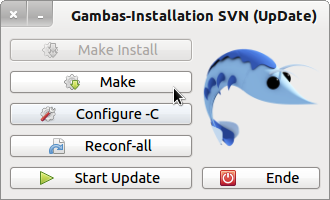Sidebar
24.14 Digression: SSH server/SSH client - installation, configuration and testing
If you value the following features in a TCP/IP connection from your computer to a remote computer:
- Authentication of the remote terminal,
- encryption of the data transmission and
- data integrity,

Figure 13.0.1: Use of command buttons (Button).
then the installation of an SSH server on the remote computer is worthwhile.
The SSH protocol enables encrypted connection of computers and execution of terminal commands on the remote computer.
24.14.1 Notes
The following notes and suggestions should be followed:
- This description describes how to install the OpenSSH server - the free implementation of 'Secure Shell'.
- An SSH client is automatically installed by all Linux distributions during installation!
Encrypted terminal connections are particularly useful when a server has been set up 'headless' - i.e. without keyboard, screen or graphical user interface. The procedure described in this excursus is only suitable for use within a home network.
24.14.7 Connection data
If you want to establish an SSH connection from your computer with an SSH client to a remote computer with an SSH server, you need the following data:
- IP address of the SSH server host or, in a DHCP environment with a DNS server, its host name and.
- the account data (name, password) of a system user on the SSH server host or
- a key pair consisting of a public and a private key (option).
As you can see, other programmes were also started on the remote computer that are known to be installed there. Note, however, that this form of connection does not support sound signals.
24.14.2 Installing OpenSSH client
This will tell you which OpenSSH packages are already installed on the remote computer. An output might look like this:
hans@mint20:~$ dpkg --list | grep openssh ii openssh-client 1:8.2p1-4ubuntu0.3 amd64 secure shell (SSH) client, for secure access to remote machines hans@mint20:~$
Good - an SSH client is already installed on this system, which is the standard on Linux mentioned earlier. Otherwise, an SSH client is quickly installed:
$ sudo apt-get update $ sudo apt-get upgrade
24.14.3 Installing OpenSSH server
An OpenSSH server is not installed by default on Ubuntu and Mint. It can be installed via the application management or you can enter the following lines one after the other in a terminal:
$ sudo apt-get update $ sudo apt-get upgrade
The Table class has these properties:
| Property | Data type | Description |
|---|---|---|
| Connection | Connection | Returns the parent Connection object of a table. |
| Name | String | Returns the name of a DB table. |
| PrimaryKey | TEXT | Returns the primary key of a DB table as string array. |
Table 22.4.6.1.1 : Properties of the class Table
Note
For primary key, because of the uniqueness, its value must never be undefined (even NULL is not allowed) and its value must occur only once.
If a primary key is transferred to another table as an additional attribute, it is called a foreign key. It can be used once per table and may be defined over one column as well as over several columns. The primary key is also the most important index in a table.
24.14.4 Controlling the OpenSSH server
Caution.
The SSH server is started automatically at every system start (default). You can change this with these two commands:
$ sudo systemctl disable openssh --Remove OpenSSH from the autostart list $ sudo systemctl enable openssh --Add OpenSSH to the autostart list again
24.14.5 Documentation
Extensive documentation on OpenSSH can be found at: www.doku.com.

